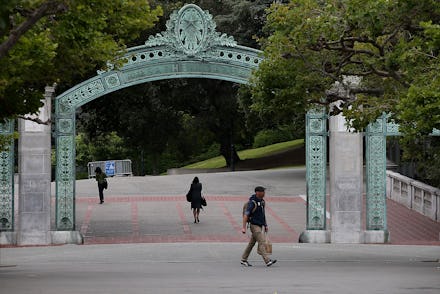UC Berkeley puts dean accused of sexual harassment on sabbatical instead of firing him

Although the University of Berkeley found that its law dean had sexually harassed a colleague, it won't be firing him outright. Instead, Sujit Choudhry will stay on as a faculty member until his "voluntary" resignation in 2018, according to the Guardian.
Choudhry gave up his position as dean in March 2016, after his former executive assistant, Tyann Sorrell, filed a lawsuit accusing him of sexual harassment. Shortly thereafter, Sorrell told the Guardian how Choudhry would treat her like his "maid" and how he would hug her and kiss her and touch her inappropriately, on a daily basis.
"I became his tool, his utility," she said. "He had access to me, not limited to my body, to treat me... in ways that made him feel comfortable irregardless of my comfort zone."
This behavior began after Choudhry assumed his position in 2014. In 2015, she emailed him to outline her concerns, after which point the school opened an investigation. It concluded that Choudhry had "violated the sexual harassment provisions of the UC Policy on Sexual Harassment and Sexual Violence," and subjected him to a 10% pay cut for the year, reducing his salary to $373,500 that year. Sorrell, meanwhile, had to use her sick and vacation days to avoid him; she spent much of that time in therapy.
The university settled Sorrell's lawsuit in late March, requiring Choudhry to foot his former assistant's $50,000 legal bill. He will also donate $50,000 to a charity of her choice and retain his position as I. Michael Heyman Professor of Law, a tenured faculty member "in good standing" until his voluntary resignation on May 31, 2018. From the end of the school year until that date, he'll be on unpaid sabbatical; for now, he gets to keep an office on campus. He also gets $97,210 in research grants and reimbursement for his travel expenses up to an annual $10,000.
He will not face formal charges.
Dan Mogulof, Berkeley's assistant vice chancellor for the office of communications and public affairs, said in an email that the settlement does prevent Choudhry from continuing to teach at the law school, and that only the Board of Regents of the University of California can take away his tenure. Sorrell filed her suit against both Choudhry and the regents, and both parties signed the settlement.
In April 2016, Mother Jones published documents from five years' worth of sexual misconduct cases. At least 19 of the university's employees had broken its rules around sexual harassment, and often, the school was complicit in helping those employees cover their tracks. But according to Leslie F. Levy, Sorrell's lawyer, the Choudhry case is among Berkeley's most egregious fumbles.
"It's extremely disappointing," Levy told the Guardian. "This is a reflection of the university once again not taking this issue seriously, and it's a reflection of privilege breeding privilege."